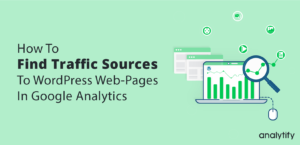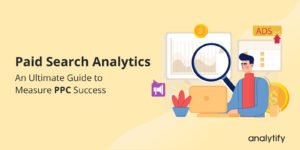
Why Google is Ending Universal Analytics in the Year 2025
Do you know why Google ended Universal Analytics and how this major shift could affect your web analytics?
Google has become the leader in Internet marketing, advertising, and data analytics over the years. Starting with Google Analytics (GA) and subsequently expanding into Universal Analytics (UA), the company’s ever-growing suite of analytics tools has consistently lifted the bar in the field of data-driven marketing.
In a groundbreaking move, Google has decided to phase out Universal Analytics in favor of Google Analytics 4 (GA4).
Many people may have been surprised by the news since Universal Analytics has been a reliable partner for many marketers, developers, and companies around the world.
This substantial transformation is more than just a new product launch; it is a strategic pivot in response to an emerging digital landscape.
In this blog post, we’ll discuss why Google is ending Universal Analytics and what it might mean for users.
Table of Contents
The Shift in the Paradigm: Universal Analytics vs. Google Analytics 4
Even though UA has been successful, Google realized that it needs to evolve to keep meeting users’ ever-changing needs. Google Analytics 4 is not just UA with new features. Rather, it is a complete reinvention of the platform to accommodate the changing data privacy landscape, the growing focus on user-centric marketing, and the demand for more advanced predictive capabilities.
The primary difference between UA and GA4 is the manner in which data is tracked and reported. GA4 is based on events, while UA’s main metrics are sessions and page views.
This fundamental shift in data modeling enables us to better understand the customer journey across devices and platforms and make better user-centric strategies.
Why Google is Ending Universal Analytics
Now, let’s get to the heart of the matter: why is Google ending Universal Analytics?
There are several important reasons:
1. Evolving User Behaviour
Over the past 10 years, people’s ways of interacting with online material have changed a lot. With the rise of digital platforms and devices, users now interact with online brands and companies through a number of different touchpoints, making user journeys complex involving different devices.
There was a need for enhanced cross-platform tracking. Even though Universal Analytics was a big deal when it came out, it has started to show that it can’t fully capture this complicated trip.
GA4 is made to handle these difficulties, which gives businesses a complete picture of how users act.
2. Mobile-First Approach
One of the main reasons to switch to GA4 is that it was made with mobile in mind. As more people than ever before use their phones to connect to the internet, there was an urgent need for a version of Google Analytics that focuses on collecting and interpreting data from mobile devices.
Even though UA had some mobile functionality, it was mostly made for viewing on a desktop. GA4, on the other hand, is made to measure how people use both apps and the web together.
3. The Need for Predictive Insights
Businesses need more than just descriptive data to understand how customers will behave in the future. They need predictive insights. GA4 uses machine learning to predict what users will do in the future, such as if they will leave, which was impossible with Universal Analytics.
Learn more about GA4 Predictive Metrics.
4. Privacy Regulations
With the implementation of GDPR in Europe and CCPA in California, among other data privacy laws, businesses must rethink how they track data. Universal Analytics uses cookies to track how users act. GA4, on the other hand, puts more emphasis on user consent.
GA4 has more privacy-focused features. It is built with privacy in mind, which isn’t just about following the rules but also about gaining the trust of people.
5. No More Third-Party Cookies
Marketers face a big problem because third-party cookies are about to disappear. Data privacy is getting more attention. Tech giants like Apple and websites like Mozilla Firefox are putting rules in place that limit third-party cookies’ use. Moreover, Google Chrome is working to eliminate third-party cookies by 2023. Businesses must change how they collect data. GA4’s focus on first-party data collection and AI-powered prediction modeling can help us figure out how to get around in a world without cookies.
6. A Simplified and Unified Approach
With GA4, Google wants to make analytics easier and more united. GA4 offers easy implementation and direct integration with media platforms. Google is encouraging businesses to switch to GA4 by phasing out Universal Analytics. This helps to standardize the way online data is tracked and studied.
7. Events-Based Tracking
GA4 is built around tracking based on events instead of the session-based tracking of UA. This makes it easier to collect data that fits your needs. You can track how people use your information and learn more about how they use it.
8. Codeless Event Tracking
By introducing easy event patterns and some codeless event tracking, Google wants to create less hassle for its users. GA4 automatically tracks certain events, e.g., page_view, without requiring adding code to your website. The Enhanced Measurement feature makes event tracking easier to set up and less hassle.
9. GA4 Is Incredibly Customizable
GA4 goes much further than Universal Analytics. It is more user-friendly and customizable in ways like making customized dimensions and events and custom reports.
GA4 lets you make your own customized events, which lets you track specific things on your website. You can change events that are already set up or by making a new event. This way, you can track conversions when people click on your ad, read a certain blog, and then put a certain color shirt in their shopping cart.
You can also make customizable reports and change which metrics show up in reports. That means you can put all the information that is important to your business.
Moreover, you’ll see the Explore tab right next to the Reports tab on the left sidebar, another important way to explore the customer journey or purchase journey through funnel tracking in GA4.

10. Seamless Product Integration
GA4 works and integrates smoothly with BigQuer, Google Ads, and Google Merchant Center.
Big Query was exclusively available to GA 360 users. Now its connection is free for GA4 users and offers a free multi-cloud, serverless data warehouse to keep your businesses current and adaptable.
Moreover, GA4 also enables you to target highly engaged or valuable audiences with Google Ads. GA4’s acquisitions report lets you view your Google Ads campaigns and import analytics conversions.
Seamless Integration of Analytify and Google Analytics 4 (GA4)

Analytify is fully compatible with GA4 and offers seamless integration. With Analytify, connecting your WordPress site to GA4 has been much easier. You can find all your essential data in one place. This makes it easier to track your web performance.
With Analytify’s better ways to track data, reports in real-time, and better security features, you can ensure your data is safe and private.
Learn more, Introducing Analytify 5.0: Fully Compatible with Google Analytics 4 (GA4)
Final Thoughts
The change from UA to GA4 is a sign of how the digital world is changing. GA4 is meant to be a more complete, privacy-concerned, and future-proof analytics option, but the change may take some time to adapt.
We hope this thorough, context-based, and future-focused study of Google’s move from Universal Analytics to Google Analytics 4 has provided the information you need to understand this huge change that why Google is ending Universal Analytics.
You may also like to know How to Migrate to Google Analytics 4 (Step by Step).
Frequently Asked Questions
What is Universal Analytics?
Universal Analytics is a Google Analytics version defining user data collection and processing. It revealed information on user behavior on a website, app, or other digital platform.
Why is Google ending Universal Analytics?
Google upgraded Google Analytics to GA4 to improve the performance of its services, adapt to new technologies or trends, or respond to user input or privacy concerns.
How will Universal Analytics be replaced?
Universal Analytics has been replaced by Google Analytics 4 (GA4). GA4 has more advanced features, such as a better connection with Google Ads, better data controls, and the ability to use machine learning to get better insights.
Will the Ending of UA affect my SEO?
Tools for analytics like GA4 and Universal Analytics don’t have a direct effect on SEO. They give you information that can help you understand SEO and make it work better. This shift to UA will not have a direct impact on your SEO.




